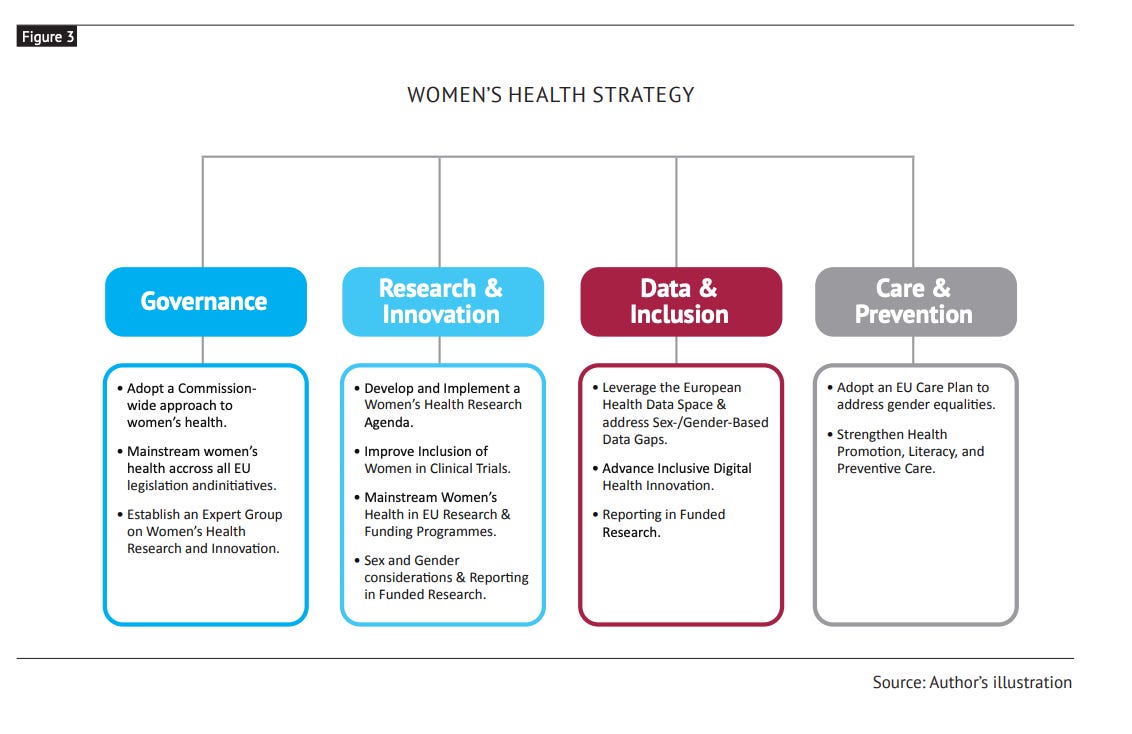Why Europe urgently needs an EU-wide women's health strategy
Think Tank EPC calls for dedicated strategy as Europe largely runs on male defaults
The European Policy Centre has called for a dedicated EU Women’s Health Strategy before the end of the mandate of the second von der Leyen Commission in 2029.
In a new report, the independent think tank argues that while the EU has made progress on gender equality, women’s health continues to lag behind due to systemic gaps in research, data, funding and policy. National strategies in countries such as Ireland, Austria and the Netherlands have shown what is possible, but the EPC warns that fragmented approaches cannot deliver the scale of change required across Europe’s single market.
The paper ‘Accelerating women’s health’ sets out a series of recommendations, including mainstreaming women’s health across all EU legislation and funding programmes, establishing an expert group on research and innovation, mandating sex-disaggregated data in clinical trials, and advancing inclusive digital health tools.
It also calls for binding EU targets on long-term care, stronger prevention and health promotion, and better use of the European Health Data Space to address data gaps.
“Considering internal and external threats to gender equality,” the report says, “the EU should position itself as a global leader in promoting women’s health, delivering benefits not only for women but for society as a whole, both within Europe and beyond.”
The scaffold Europe needs
While Europe is one of the largest health markets in the world it is also one of the most fragmented. National strategies and regulations differ widely, creating silos that slow progress and make scaling innovation unnecessarily difficult.
For women’s health ventures, this fragmentation means facing a patchwork of clinical guidelines, regulatory demands, and market barriers across dozens of jurisdictions. The result is added costs, slower implementation, and a lost opportunity to deliver solutions at the speed women deserve.
Anastasiya Markvarde, a women’s health and health innovation expert from Finland and author of Women’s Health Digest, said an EU-wide strategy could help member states move faster and more systematically.
“We are not fast enough with implementation – take clinical guidelines on menopause, for example, which often lack systematic protocols while menopause itself remains under-recognised in clinical practice,” she said.
She added that a European framework would make scaling women’s health innovation easier across borders.
“The EU strategy would stimulate the member states to act accordingly, and would of course promote the exchange of best practices between the countries, making us stronger as a region.”
Markvarde pointed to the barriers women’s health ventures face, from stricter regulatory requirements to difficulty marketing products online due to social media restrictions.
“We need to implement concrete instruments to help women’s health startups scale in Europe. Besides funding – which must be targeted and systematic – it’s crucial also to create support ecosystems for these innovations. One example could be women’s health accelerators, offering hands-on help for EU-wide scaling.”
Anastasiya also stressed the importance of maintaining a broad vision.
“Women’s health is not limited to gynaecology or fertility, it touches on every therapeutic area, from cardiovascular to neurology and rare diseases.”
Building on EU efforts to advance women’s health
The EPC acknowledges that some efforts have been made within the EU to address challenges. It calls out women’s health strategies such as those implemented in Ireland, Austria and the Netherlands as strong models of best practice that can inform and inspire policy developments across the EU and beyond.
FemTech France’s dedicated investment fund and the establishment of the Nordic Women’s Health Hub are also called out as examples of good national practice.
At the European level, the European Commission, namely the Directorate-General Research and Innovation, has funded over 1000 research and innovation projects under the Horizon 2020 and Horizon Europe programmes, investing over €2 billion.
Key focus areas include cancer screening and prevention, with projects such as MammoScreen and HPV-FASTER-Implement; as well as projects in maternal and child health, cardiovascular health, reproductive health, infectious diseases, and mental health (HappyMums, MATER).
The EU has also mandated the integration of gender sensitive methodologies in all Horizon-funded projects, alongside the requirement for Gender Equality Plans among participating institutions.
Missed opportunities
However, the EPC report sets out that more needs to be done. It references recent updates to the EU’s General Pharmaceutical Legislation which ‘missed an opportunity’ to mandate the collection and reporting of sex-disaggregated data in all clinical trials and regulatory submissions. It also says that the EU’s Life Sciences Strategy includes almost no mention of women’s health.
“This approach should not be repeated with future initiatives such as the Biotech Act or the proposed EU Cardiovascular Health plan,” states the report, “as failure to meaningfully incorporate women’s health considerations would significantly impede the achievement of substantive and tangible progress.”
The think tank concludes that the EU has both the evidence and the tools to act, but only a coordinated strategy can ensure progress at the speed and scale required.
“Women’s health must be mainstreamed into all EU legislation and initiatives that concern health in any way” it says.



